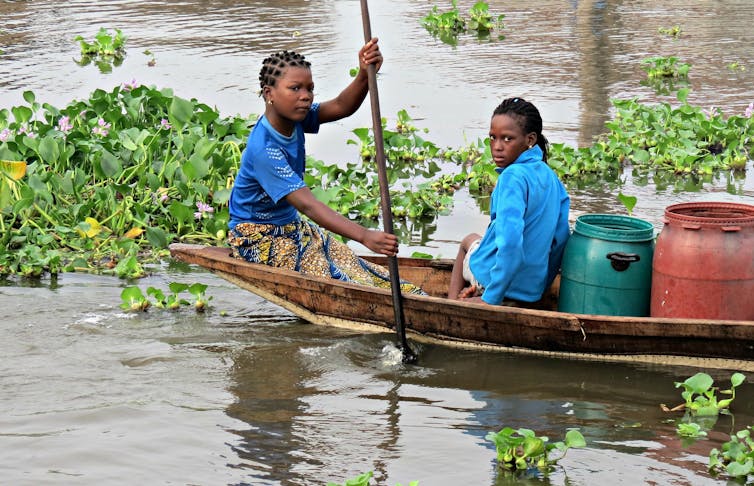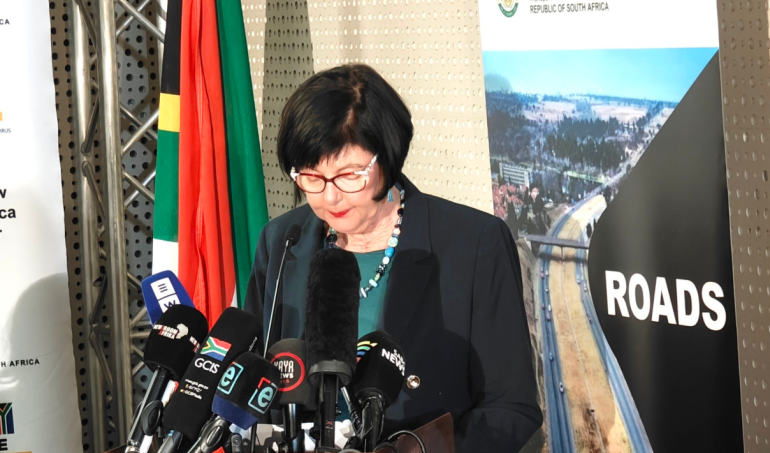Girls in West Africa offered into sexual slavery as ‘wives of gods’
By: Wisdom Mensah, University of West Florida

Linda De Volder/Flickr
There are global efforts fighting modern slavery, but one traditional system is still holding strong in West Africa: Trokosi. The Conversation Africa’s Moina Spooner spoke to Wisdom Mensah about the system and what can be done to finally put a stop to it.
What is Trokosi?
Trokosi is a traditional system where virgin girls, some as young as six years old, are sent into Troxovi shrines (shrines for gods) as slaves to make amends for wrongs committed by a member of the virgin girl’s family. Until the Trokosi system came to the attention of the general public in the 1990s, girls sent to the shrines stayed for life. After the 90’s some of the priests and elders were willing to let the girls go back home after a few years, for a few months, but had to return whenever they were sent for. When they die, the family must replace her with another virgin girl. This means that the family will pay reparation, of one girl, forever.
The Trokosi system is based on the belief that gods have the power to search for wrongdoers and punish them. People who feel an injustice has been committed against them, go to the shrine and place a curse on the offender so that they will be punished by the gods. These curses take several forms, strange sicknesses, unexplained deaths, incurable diseases or successive deaths within a family.
When the virgin girls are sent to the shrines, they become the “wives of the gods” and are sexually exploited by the priests and shrine elders. The shrine priest is the spiritual head of the shrine and “proxy for the gods” while clansmen can be appointed as elders of the shrine. The girls are forced to work in any capacity that suits these priests and elders – for instance, on their farms.
If there are children born out of the relationship with them, they become the responsibility of the virgin girls’ family.
The Trokosi girls live in constant hunger, deprivation, and poverty.
How prevalent is it and where is it practised?
It’s not sure when Trokosi systems began, but it’s an ancient practice. The word Trokosi comes from the Ewe language, Ewe communities found in Benin, Togo and Ghana. It’s a combination of two Ewe words “tro” and “kosi.” “Tro” means god or deity, and “kosi” means slave. Trokosi therefore means “slave of God.”
Most of the people that live in the southern Volta Region of Ghana, southern Togo, and southern Benin believe and practice the Trokosi system. I was involved in the liberation campaign of the Trokosis in the 1990s, and by 2002, 4,000 women and children from 52 shrines were liberated.
Why has it been a challenge for governments to end it?
In 1998 the Ghanaian government passed a law criminalising the Trokosi practice.
Despite this, it continued because governmental agencies responsible for enforcing the law didn’t have the courage to arrest the family members, priests or shrine owners. The system invokes fear in the hearts of most people including the law enforcement personnel.
Trokosi practising communities strongly believe in the power of gods to cause calamities to families. Trokosi priests ensure they are reminded of this by issuing warnings that they must send their virgin girls as objects of reparation.
The practice also thrives because there’s a group of traditionalists, mostly male, who strongly believe that Trokosi is part of the Ewe’s cultural heritage and must be preserved. They therefore oppose every attempt to stop the practice.
What other approaches should be tried?
Over the past two decades, Ghana’s human rights commission and various NGOs adopted different intervention approaches to end the practice. The strategies which worked best included:
- Joint campaigns involving both NGOs and Ghana’s commission on human rights
- Encouraging Trokosi priests and elders to accept other objects of reparation, instead of people. For instance, several shrines have modernised the practice by replacing virgin girls with cows as objects of reparation.
- Negotiations with priests and shrine elders to set slaves free and sign legal documents to ensure they won’t go back to the practice. In exchange they receive a package that will help them generate income, replacing the loss of human capital. For instance, a number of cows that they can breed.
- Whilst the Trokosi women are still enslaved they can be provided with vocational skills training. They gain much needed skills which will help them generate income and support their children in the future – and it also creates some distance between them and the shrine as they attend the training in centres every day. Once free, the women need micro-financing and also emotional and mental support.
- Finally, since this issue is a gross human rights violation against women and children, the International Community should put pressure on the government and people of Ghana to enforce the 1998 law making the Trokosi practice a crime. If pressure is brought by international organisations such as the United Nations, African Union, ECOWAS, European Union etc. the practice of Trokosi in West Africa can be brought to an end quickly.

Wisdom Mensah, Visiting Instructor, University of West Florida
This article is republished from The Conversation under a Creative Commons license. Read the original article.
Written by: Natasha
Similar posts
MORE ARTICLES

Powerball Results: Draw Tuesday, 29 April 2025

Cassper Nyovest takes Fill-Up to Bloemfontein’s Free State stadium

‘I found my husband holding his ex-wife in his arms’ – The Blind Spot

Thomas Mlambo mourns the passing of his father

‘You made me a mom’ – Sedi Matsunyane marks her son Ro’s 10th birthday
QUICK LINKS
UpComing Shows

The Best T in the City
With T Bose
He has held it down in the world of mid-morning radio with the best music, riveting topics, brilliant mixes and interesting guests. Every weekday, The Best T proves why he is the BEST by connecting to you like only your bro or favourite uncle could. He lets his listeners dictate the songs they want to hear in the ever-popular Top 10 at 10, and his Three Teaspoons never run out. Catch The Best T in the City Mondays to Fridays from 09h00 to 12h00.
close
Feel Good
With Andy Maqondwana
Feel good about feeling good! That's exactly what The Feel-Good show is about. An escape from the negativity that surrounds us, indulging you in good feels. Pass it on to one and all. Spread the good feeling around Gauteng with Andy Maqondwana.
close
Kaya Biz
With Gugulethu Mfuphi
The world of business is simplified for you by Kaya Biz with Gugulethu Mfuphi. This fast-paced award-winning business show talks to the corporate giants as well as up and coming entrepreneurs about their wins and challenges. Gugulethu invites guests to offer their analyses of markets and economies, and also delves into issues of personal financial wellness. Kaya Biz airs Mondays to Thursdays 18h00 to 19h00.
close
Point of View
With Phemelo Motene
Point of View with Phemelo Motene delves into the day’s current affairs, touches on real issues that affect people’s daily lives and shares expert advice on questions posed by the audience. Mondays to Thursdays 20:00 to 22:00.
closeConnect with Kaya 959
DownLoad Our Mobile App
© 2024 Kaya 959 | On The Street On The Air











